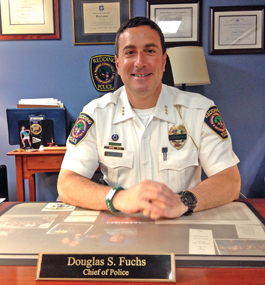Changing the Course of Tragedy

Doug Fuchs '88
Redding, Conn., police chief Doug Fuchs ’88 listened to his cruiser radio on Dec. 14, 2012, in surreal disbelief. Were those the sounds of a routine police-training evacuation exercise at Sandy Hook Elementary School, he recalls thinking, or not?
Moments later, Fuchs and fellow officers responded to the mass shooting at the school in neighboring Newtown, where a 20-year-old man had killed 20 students and six adults with a semiautomatic rifle before fatally shooting himself.
That day, Fuchs oversaw a difficult process: reuniting emotional parents with students who had been evacuated to a nearby fire station. He directed a crowd of hundreds into three groups: parents already with their children, children waiting for their parents to arrive and parents desperate to find their children. The third group was escorted into a private room at the back of the station to be shielded from the media and prepared for what might be devastating news.
The first few hours on the scene were overwhelming. “We were so immersed in doing what we needed to do for others, we were numb,” Fuchs says. It wasn’t until that evening that the magnitude of the tragedy hit him.
Over the next 10 days, as Newtown’s police department recovered from the trauma, Fuchs, whose own children had attended Sandy Hook, managed a massive law-enforcement operation in support of the Newtown police and community. He supervised nearly 1,000 police officers from across the state who provided security for the schools and the victims’ families; escorted families to and from funerals; and handled the media, gifts and onlookers descending on Newtown.
After the shooting, Fuchs says, he resolved to work for achievable, meaningful reform of gun laws. Limiting magazine capacity to 10 rounds, he believed, would be an important gun restriction. At Sandy Hook, six children were able to escape the carnage when the shooter changed the magazine in his rifle.
“There are children alive in our community because the shooter had to do something with his magazine,” says Fuchs. “It gave them the chance to run, and they are alive today because of it.
“Guns are out there,” he continues. “We’re not getting them back. But limiting magazines changes the game in a mass shooting. It’s something we can do that will save lives.”
As an advocate for limiting magazine capacity, Fuchs has spoken at legislative hearings and anti-violence conferences, and served as an expert witness in federal court in Colorado, defending a state gun-restriction law that had been challenged.
Fuchs has documented countless cases that show how a ban on high-capacity magazines could save lives. “There has never been an incident in the United States where a civilian has needed more than 10 rounds to defend him- or herself,” he says. “But during a mass shooting, potential victims can flee or law enforcement can intervene when the shooter has to change magazines.”
His and others’ efforts are paying off. Connecticut implemented a law limiting magazine capacity, and the state of Colorado prevailed in its limit on magazines.
The tragedy at Sandy Hook “made me a better police officer and brought the Newtown community together,” Fuchs says. “We are all trying to make our little piece of the world just a little bit better than it was when we found it.”
— Amy Halzel Willis ’87
